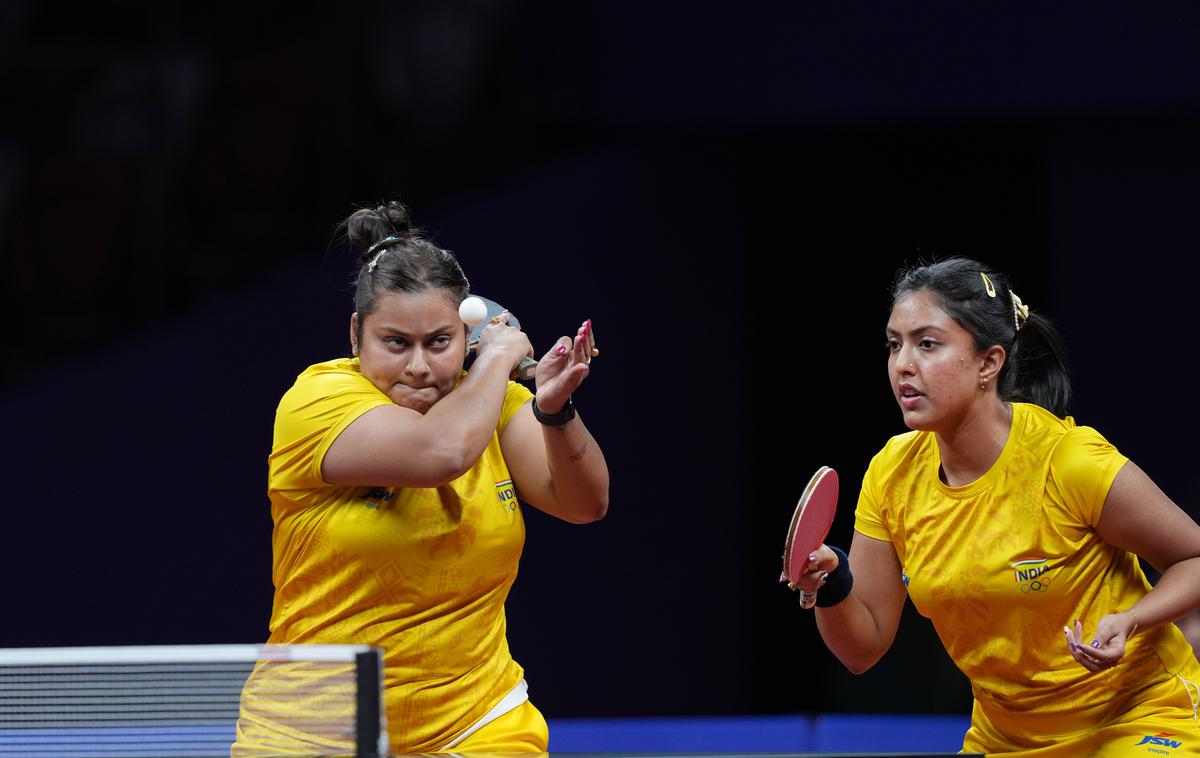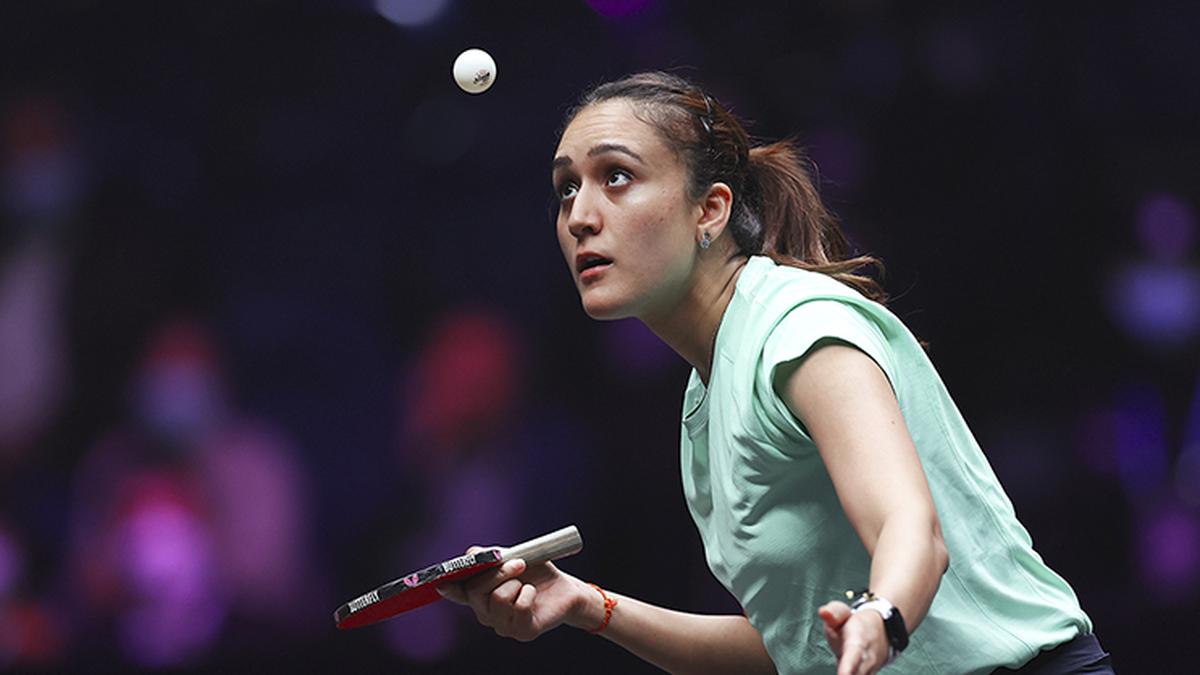Indian table tennis in 2024: India’s fortunes tied to Paris exploits
September 30, 2023, marked a historic moment in the annals of Indian sports and world table tennis. It was the day two girls from interior West Bengal made history in table tennis, triumphing over the Chinese team on their turf during a major continental sports event.
Sutirtha Mukherjee and Ayhika Mukherjee stunned Chen Meng and Wang Yidi, the World No. 2 pair, in the women’s doubles quarterfinal of the Hangzhou Asian Games. The win ensured a historic medal — the first all-women medal for Indian table tennis — at the Asian Games.
The victory instilled the belief that even the formidable Chinese team could be defeated on the grandest stage. For Indian table tennis, it reiterated that the two bronze medals in Jakarta in 2018, including the men’s team and mixed doubles, were not isolated successes. It showed that Indian paddlers were ready to compete at a higher level, beyond Commonwealth achievements.
Although recent, this achievement, along with the unpredictable events of 2023, has become a part of history. The upcoming year remains a mystery, at least for now.
Despite securing podium finishes three times in the last two Asian Games, Indian table tennis still faces a challenge when it comes to the Olympics. Olympic qualification relies on making the most of the available spots.
In a change of pace, the women have a better chance than their male counterparts in Olympic qualification. Manika Batra, having taken over the baton from A. Sharath Kamal as India’s torchbearer in global table tennis, is the sole confirmed Indian participant for the Paris Olympics.

Mukherjee Mania: Ayhika Mukherjee and Sutirtha Mukherjee stunned China’s world No 2 pair to win a historic women’s doubles table tennis medal for India at the last Asian Games.
| Photo Credit:
PTI
Mukherjee Mania: Ayhika Mukherjee and Sutirtha Mukherjee stunned China’s world No 2 pair to win a historic women’s doubles table tennis medal for India at the last Asian Games.
| Photo Credit:
PTI
Ranked 35 at the beginning of the year, Manika achieved the distinction of being the first Indian to win two matches at the Tokyo Olympics in 2021. With a new personal coach in Aman Balgu, she aspires to reach at least the round of 16 in Paris. However, Manika acknowledges that the path ahead won’t be without challenges.
Manika, who gave a tough fight to Wang Yidi before losing the singles quarterfinal 2-4 in Hangzhou, is aiming to break into the top-25 world rankings. She had achieved her career high of No. 31 in November 2023, but now needs to maintain consistency throughout the year to achieve her objective.
The Mukherjees, who had upstaged the World No. 1 Korean pair of Jeon Jihee and Shin Yubin to win a WTT Contender event in Tunis before the Asian Games miracle, will know that the road to Paris is the hardest, considering the doubles event will continue to have only 16 pairs.
If they do not seal a place through the Olympic qualification event in March–April, the duo will have to rely on the World Rankings in early May to make the cut. If they make the cut, as they showed in Hangzhou and Tunis, they can definitely stun fancied opponents.
As for the men, the road to Paris will depend primarily on the World Championships in Busan in February.
Ranked No. 16 at the turn of the calendar, should they fail to make it to the round of 16, the men will have to rely on the World Rankings in May to have an outside chance of qualification.
However, the team rankings are determined based on the individual player rankings. Harmeet Desai, ranked in the 60s, is India’s highest-ranked paddler for now, having overtaken Sharath and G. Sathiyan. The Tamil Nadu duo slipped beyond the top 100 due to a prolonged break at the start of the year and a dip in form later on. They managed to climb back to the 90s but still need to improve their rankings to qualify for singles. Instead, if the team qualifies, it will result in three men’s quotas, including two singles spots, being sealed. While the paddlers continue to hone their game, the onus will be on the Table Tennis Federation of India (TTFI) to appoint full-time head coaches for both the men’s and women’s squads to provide the best possible support to the experienced players. Subhajit Saha, Sourav Chakravarty (men), and Mamata Prabhu (women) have done a commendable job whenever handed the responsibility to guide the teams in 2023. But with no proper contract and no control as a result, they had limitations when it came to working on a per-assignment basis.
Making it count: Harmeet Desai, ranked in the 60s, is India’s highest-ranked paddler for now, having overtaken Sharath Kamal and G. Sathiyan.
| Photo Credit:
A. M. FARUQUI
Making it count: Harmeet Desai, ranked in the 60s, is India’s highest-ranked paddler for now, having overtaken Sharath Kamal and G. Sathiyan.
| Photo Credit:
A. M. FARUQUI
The domestic circuit must also be streamlined further. After a tumultuous couple of years in the aftermath of the Tokyo debacle, dominated by a court-appointed Committee of Administrators, the TTFI has successfully staged a full season of domestic tournaments.
But with the Annual General Meeting delayed, primarily due to the cold war between the warring factions and the international stars requesting the calendar be wound up before the New Year, the season ended up being hastily organised.
The TTFI should look at announcing the domestic events calendar well in advance this time, ensuring maximum participation of international stars in national ranking events.
It is also high time the TTFI expanded the domestic ranking system into a much more comprehensive one to motivate paddlers. For starters, a points system can be devised for every round — even qualifiers — at the national ranking tournaments so that every participant will find a mention in the national rankings list.
The age-fudging menace in the domestic age-group circuit — a bane for Indian sport — has to be handled more strictly to ensure those following the rules are not disheartened.
Despite the domestic issues, the success of Indian table tennis in 2024 will depend on the number of qualifiers for Paris. If any of them get even remotely close to being in medal contention, it will be nothing but icing on the cake!



